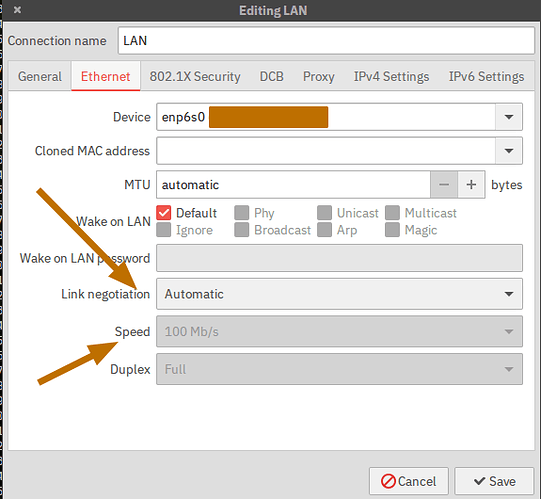Im connected direct to 1Gb fiber and my card support it but :
inxi -Fxxxza
System: Kernel: 5.11.12-zen1-1-zen x86_64 bits: 64 compiler: gcc v: 10.2.0
parameters: BOOT_IMAGE=/@/boot/vmlinuz-linux-zen root=UUID=ed406cd9-838d-475e-a18a-0f78fca0ec66
rw rootflags=subvol=@ quiet splash rd.udev.log_priority=3 vt.global_cursor_default=0
systemd.unified_cgroup_hierarchy=1 loglevel=3
Desktop: KDE Plasma 5.21.4 tk: Qt 5.15.2 info: latte-dock wm: kwin_x11 vt: 1 dm: SDDM
Distro: Garuda Linux base: Arch Linux
Machine: Type: Desktop System: Dell product: Vostro 230 v: 00 serial: <filter> Chassis: type: 3
serial: <filter>
Mobo: Dell model: 07N90W v: A02 serial: <filter> BIOS: Dell v: 1.4.0 date: 12/09/2010
Battery: Device-1: hidpp_battery_0 model: Logitech Wireless Touch Keyboard K400 Plus serial: <filter>
charge: 100% (should be ignored) rechargeable: yes status: Discharging
CPU: Info: Dual Core model: Pentium E6700 bits: 64 type: MCP arch: Penryn family: 6
model-id: 17 (23) stepping: A (10) microcode: A0B cache: L2: 2 MiB
flags: lm nx pae sse sse2 sse3 ssse3 vmx bogomips: 12767
Speed: 1662 MHz min/max: N/A Core speeds (MHz): 1: 1662 2: 3192
Vulnerabilities: Type: itlb_multihit status: KVM: VMX disabled
Type: l1tf mitigation: PTE Inversion; VMX: EPT disabled
Type: mds status: Vulnerable: Clear CPU buffers attempted, no microcode; SMT disabled
Type: meltdown mitigation: PTI
Type: spec_store_bypass status: Vulnerable
Type: spectre_v1 mitigation: usercopy/swapgs barriers and __user pointer sanitization
Type: spectre_v2 mitigation: Full generic retpoline, STIBP: disabled, RSB filling
Type: srbds status: Not affected
Type: tsx_async_abort status: Not affected
Graphics: Device-1: NVIDIA GP106 [GeForce GTX 1060 3GB] driver: nvidia v: 460.67
alternate: nouveau,nvidia_drm bus-ID: 01:00.0 chip-ID: 10de:1c02 class-ID: 0300
Display: x11 server: X.Org 1.20.10 compositor: kwin_x11 driver: loaded: nvidia display-ID: :0
screens: 1
Screen-1: 0 s-res: 1920x1200 s-dpi: 95 s-size: 513x321mm (20.2x12.6") s-diag: 605mm (23.8")
Monitor-1: DVI-D-0 res: 1920x1200 hz: 60 dpi: 94 size: 518x324mm (20.4x12.8")
diag: 611mm (24.1")
OpenGL: renderer: GeForce GTX 1060 3GB/PCIe/SSE2 v: 4.6.0 NVIDIA 460.67 direct render: Yes
Audio: Device-1: Intel NM10/ICH7 Family High Definition Audio vendor: Dell driver: snd_hda_intel
v: kernel bus-ID: 00:1b.0 chip-ID: 8086:27d8 class-ID: 0403
Device-2: NVIDIA GP106 High Definition Audio driver: snd_hda_intel v: kernel bus-ID: 01:00.1
chip-ID: 10de:10f1 class-ID: 0403
Sound Server-1: ALSA v: k5.11.12-zen1-1-zen running: yes
Sound Server-2: JACK v: 0.125.0 running: no
Sound Server-3: PulseAudio v: 14.2 running: yes
Sound Server-4: PipeWire v: 0.3.25 running: no
Network: Device-1: Broadcom NetLink BCM57788 Gigabit Ethernet PCIe vendor: Dell driver: tg3 v: kernel
port: ec00 bus-ID: 03:00.0 chip-ID: 14e4:1691 class-ID: 0200
IF: enp3s0 state: up speed: 100 Mbps duplex: full mac: <filter>
Drives: Local Storage: total: 149.06 GiB used: 23.46 GiB (15.7%)
SMART Message: Unable to run smartctl. Root privileges required.
ID-1: /dev/sda maj-min: 8:0 vendor: Intel model: SSDSA2M080G2GC size: 74.53 GiB block-size:
physical: 512 B logical: 512 B speed: <unknown> rotation: SSD serial: <filter> rev: 02M3
scheme: MBR
ID-2: /dev/sdb maj-min: 8:16 vendor: Western Digital model: WD800JD-60LSA0 size: 74.53 GiB
block-size: physical: 512 B logical: 512 B speed: <unknown> serial: <filter> rev: 1D07
scheme: MBR
Partition: ID-1: / raw-size: 74.53 GiB size: 74.53 GiB (100.00%) used: 23.46 GiB (31.5%) fs: btrfs
dev: /dev/sda1 maj-min: 8:1
ID-2: /home raw-size: 74.53 GiB size: 74.53 GiB (100.00%) used: 23.46 GiB (31.5%) fs: btrfs
dev: /dev/sda1 maj-min: 8:1
ID-3: /var/log raw-size: 74.53 GiB size: 74.53 GiB (100.00%) used: 23.46 GiB (31.5%) fs: btrfs
dev: /dev/sda1 maj-min: 8:1
ID-4: /var/tmp raw-size: 74.53 GiB size: 74.53 GiB (100.00%) used: 23.46 GiB (31.5%) fs: btrfs
dev: /dev/sda1 maj-min: 8:1
Swap: Kernel: swappiness: 10 (default 60) cache-pressure: 75 (default 100)
ID-1: swap-1 type: zram size: 1.92 GiB used: 165.3 MiB (8.4%) priority: 32767 dev: /dev/zram0
ID-2: swap-2 type: zram size: 1.92 GiB used: 167.2 MiB (8.5%) priority: 32767 dev: /dev/zram1
Sensors: System Temperatures: cpu: 41.0 C mobo: N/A gpu: nvidia temp: 39 C
Fan Speeds (RPM): cpu: 1573 mobo: 901 gpu: nvidia fan: 25%
Info: Processes: 175 Uptime: 6m wakeups: 2 Memory: 3.83 GiB used: 2.49 GiB (64.8%) Init: systemd
v: 248 tool: systemctl Compilers: gcc: 10.2.0 clang: 11.1.0 Packages: pacman: 1788 lib: 347
Shell: fish v: 3.2.1 running-in: konsole inxi: 3.3.03
Must be wrong “driver” installed.
Its a wired connection. No wifi used.
Please help.
Please read
Read

